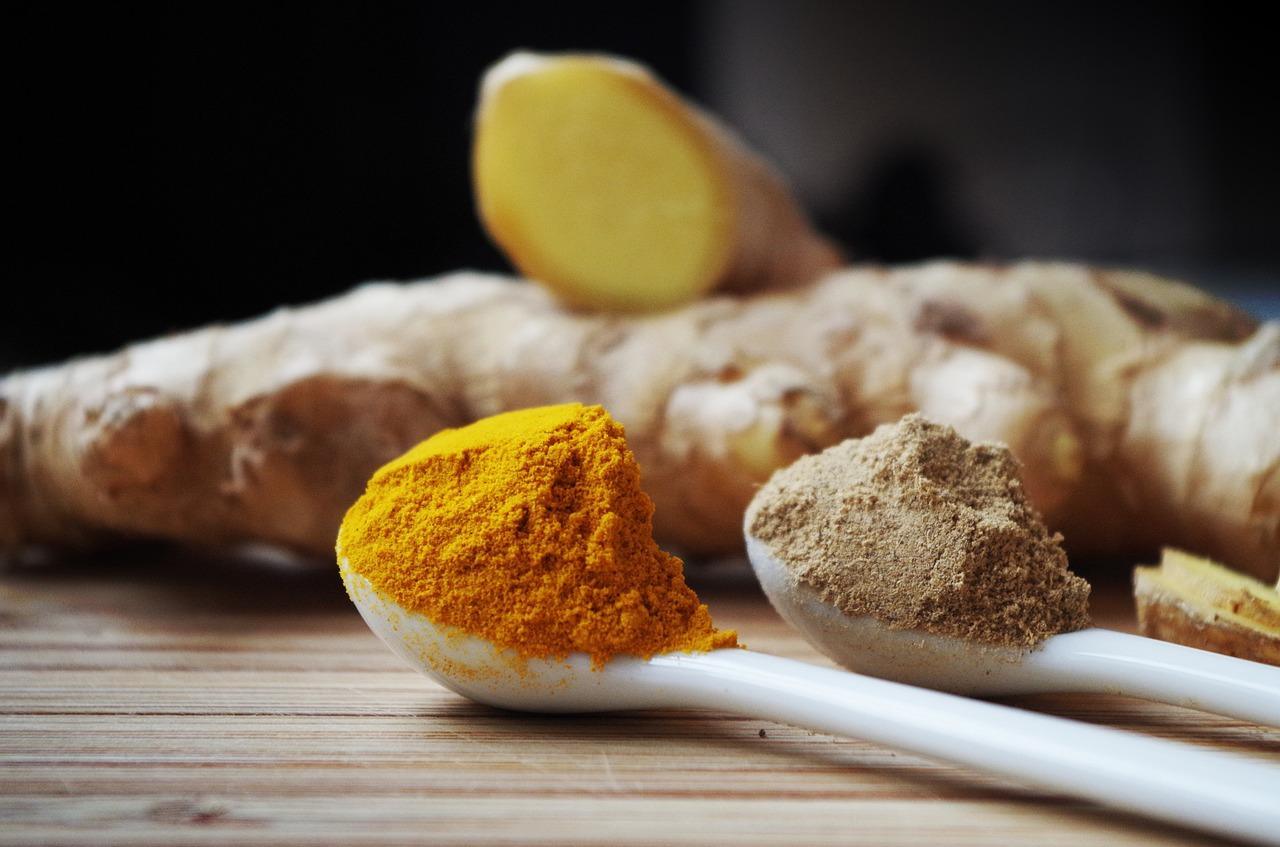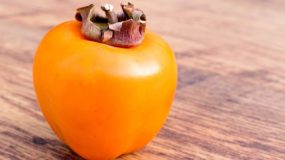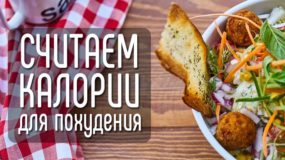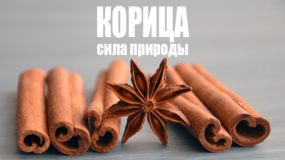Every housewife knows about turmeric. But its history, useful properties, contraindications and scope for many remain a mystery.
Turmeric - what is it?
Long Turmeric - Indian plant, characterized by amazing properties and unique taste and aromatic features. The leaves and root of the herb are used to make the world's most popular spices.
Turmeric is saturated with coloring pigments of golden color, thanks to which it has found application in cooking, food industry, cosmetology and textile industry. The cost of this popular spice is low, so it is used instead of the expensive saffron.
As a spice, people have been using turmeric for over 2500 years. Initially, it was used in India and Indochina, until at the end of the first century it was brought to Ancient Greece. In China, spice appeared much later. Local breeders managed to bring out the best commercial varieties that are very much appreciated in the world, since they rarely appear on the world market.
In addition to turmeric, there are another 40 varieties of plants, of which only three were used in the food industry.
- Fragrant turmeric. Often mistakenly referred to as Indian saffron. Usually used in the preparation of confectionery, where it is valued above long turmeric.
- Round turmeric. Make starch. It is rare in our area, but in the East it is used in cooking.
- Turmeric Zedoaria. A small pear-shaped root is sold in cut form. Is used in the production of liquors as a natural substitute for turmeric.
Cooking is a time-consuming process. The lateral roots of turmeric are boiled with the addition of dyes and dried. After peeling, the tubers turn orange. The central root is not used. It is found in stores in the form of powder and whole roots.
When choosing turmeric, they focus on appearance. If the root is dense and without damage, it is suitable for consumption. Choose by color is not worth it, because depending on the circumstances, it can change the root color. Help in choosing and touch. Fresh root has a spicy and pungent odor.
It is better to store the seasoning in a glass container with a tight lid, otherwise the spice will lose its original smell and absorb foreign odors.
Useful properties and contraindications of turmeric
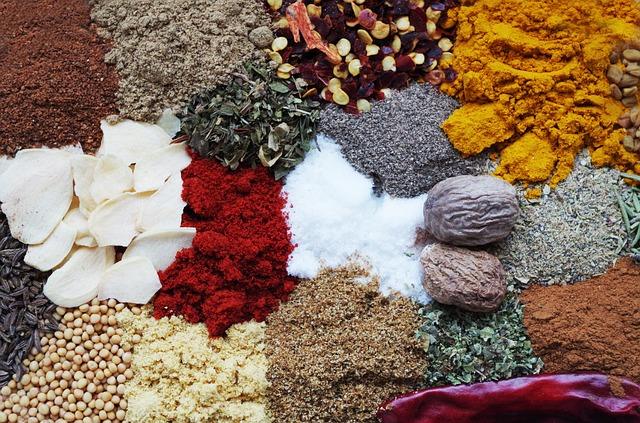
Ancient Chinese healers were the first to learn about the benefits of turmeric. They used it in practice as an anti-inflammatory and painkiller. Scientists have proven that spice stimulates metabiosis and has a choleretic effect, and antibacterial properties are sufficient to inhibit the development of tuberculosis.
The use of "Indian saffron" improves digestion and growth of beneficial microflora. The healing properties, unlike other natural antibiotics, are mild, without affecting the liver.
The composition of the spice includes the natural dye curcumin. The substance destroys cancer cells without harming healthy organs and tissues. Turmeric is used to treat burns and wounds.
Video about the benefits and harms of turmeric
What other useful properties are inherent in it?
- Slowing the development of melanoma and the destruction of already formed cells.
- Prostate cancer prevention (paired with cauliflower).
- Destruction of amyloid plaques in the brain.
- Leukemia Prevention.
- Prevention of the appearance of metastases in cancer.
- Slowing the development of sclerosis.
- Stabilization of body weight.
- Management of symptoms of depression.
- Providing anti-inflammatory action for arthritis.
- Slowing the growth of blood vessels in neoplasms of a malignant nature.
- Itching eczema, psoriasis and furunculosis.
- Acceleration of wound healing.
Since turmeric has a strong effect on the human body, it also has contraindications.
When should you not use spice?
- During pregnancy during the first trimester.
- When taking blood-thinning medications.
- In chronic diseases.
- When taking diabetic medication.
- With clogged biliary tract.
- With gallstone disease.
It is not difficult to determine the negative effect of spice on the body. It manifests itself in the form of diarrhea, nausea, severe dizziness and general weakness. Doctors recommend consuming turmeric in moderation. Compliance with the correct dosage will be beneficial, and excess is fraught with serious consequences.
Indian Recipes
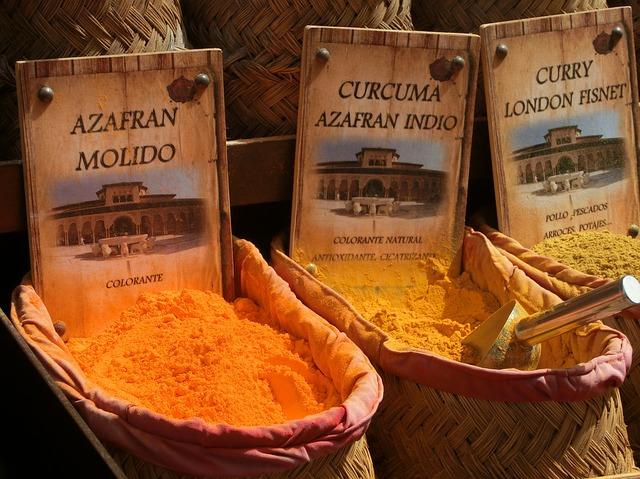
The people of India are well aware of the healing properties and benefits of turmeric. The indisputable proof of this is the widespread use of spices in national cuisine.
A conversation on this topic can take hours. I think it’s better if I give a few recipes from Indian cuisine that have taken root in my cookbook forever and are constantly used.
Turmeric Rice
- Rice - 1 cup.
- Butter - 1 spoon.
- Water - 2 glasses.
- Salt - 0.5 tablespoons.
- Turmeric - 0.25 tablespoons.
- Ground pepper.
- I wash the rice cereal with exclusively cold water, carefully rubbing it with my palm or fingers. After removing the particles of rice flour, the remains of the husk and grains of garbage, I slightly dry the cereal.
- I pour water into a small container and put it on the stove. While the liquid is boiling, melt the oil in a pan with a thick bottom, add salt, turmeric, cereal and lightly fry.
- Initially, rice will become transparent, and a little later it will become milky. Immediately after this, pour the rice with boiling water, cover with a lid and turn down the heat. Rice 15 minutes to cook. If I cook unpolished cereals, I increase the cooking time by 10 minutes.
Parachti with potatoes
- Flour - 1 cup.
- Salt - 2 spoons.
- Warm water - 0.25 cups.
- Mashed potatoes - 1 cup.
- Ground pepper - 0.5 tablespoons.
- Turmeric - 0.25 tablespoons.
- In a deep bowl, mix a glass of flour and half a teaspoon of salt, pour in water and knead the dough.
- I divide the resulting mass into six parts and make rounded cakes. With a rolling pin, I make mugs with a diameter of ten centimeters.
- To prepare the filling, mashed potato with salt, season with pepper and turmeric. I proceed to the formation of a parachute.
- I put a spoonful of filling in the center of each circle, cover with the second circle and squeeze the edges. To better hold them together, pre-wet them with water.
- I fry the formed cakes in oil on both sides to an appetizing crust.
Indian Pea Soup
- Sunflower oil - 2 tablespoons.
- Onion - 1 head.
- Garlic - 3 cloves.
- Ginger - 2 tablespoons.
- Chives - 1 bunch.
- Red pepper - 1 pc.
- Peas - 450 g
- Turmeric - 0.25 tablespoons.
- Cilantro - 2 spoons.
- Lime juice - 2 tablespoons.
- Mustard seeds - 1 spoon.
- Cumin seeds - 2 tablespoons.
- In a cauldron with thick walls, I heat the oil over high heat, add chopped onions, crushed garlic, chopped herbs, ginger, salt and red pepper. Three minutes later, add turmeric.
- I send the peas into the container, pour eight glasses of water, bring the liquid to a boil, reduce the heat and I'm cooking soupuntil the peas are chopped.It takes about an hour.
- In a small frying pan I heat the oil, fry the cumin seeds and mustard seeds, a maximum of half a minute. I send the fried spices to the soup, mix and leave for 10 minutes under the lid.
- I add cilantro and lime juice to the soup, mix, put salt. Serving to the table with slices of lime.
In each of the three recipes, spice is used in small quantities, but significantly affects the taste of the finished dish. Try the recipes in practice, and you will see for yourself.
Where is turmeric seasoning added?
I wonder what dishes add turmeric? Not every spice improves the aromatic characteristics of the treat.
In eastern countries, cooks willingly add turmeric to dishes of fish, meat, vegetables. In Tajikistan, they add to sweet drinks, in Europe they are used to give color. pasta, liquors, oils, cakes and pastries. Turmeric increases the shelf life of cooked dishes.
The spice gives the culinary masterpieces from beans an unusual taste, and the dough has an unrivaled aroma and beautiful color.
Americans add to meatUzbeks season lamb soup. The English cannot imagine omelets without her.
Golden milk with turmeric
The drink in question is truly “golden”, and not only in color, but also in useful properties for the body. Many have long experienced the healing effect of golden milk with turmeric on their own.
The healers say that the action of golden milk is based on the strong anti-inflammatory property of the seasoning, due to which the drink suppresses pathogenic processes.
Drink base
To prepare the base, a glass of water is mixed with two tablespoons of turmeric, brought to a boil, the heat is reduced and the mixture is cooked for 10 minutes stirring. The result is a thick paste, reminiscent of the consistency of ordinary ketchup. The composition is stored in a glass jar in the refrigerator for one month.
Golden milk drink
To make a miraculous drink golden milk, add a teaspoon of pasta to a glass of heated milk. After this, the process of turning milk into miraculous nectar begins. After a minute, they use it. Some people add fruit syrup or almond oil to the drink.
The duration of treatment using golden milk is forty days. Such therapy involves the use of a drink before bedtime. It is recommended to conduct no more than two courses per year.
Traditional medicine recipes with turmeric
The unique qualities of turmeric have been used in folk medicine. It is used for the treatment and prevention of ulcerative colitis, gallstone disease, obesity, infectious hepatitis. When added to juice, a cocktail, or a dish, turmeric improves digestion and reduces cravings for fatty and sugary foods. I will consider the most popular recipes of traditional medicine depending on the disease.
- For weight loss. To achieve the result, turmeric is not consumed in its pure form, but mixed with other products. Recipe: bring half a liter of water to a boil, remove from heat, add three tablespoons of tea, three pieces of ginger, a spoon of honey and a quarter of a small spoon of turmeric. After cooling and filtering, 500 ml of kefir is added to the mixture. Drink a drink instead of dinner.
- For joints. Joint treatment with turmeric is quite lengthy. First, turmeric is made into a paste, as for golden milk. A spoonful of pasta is combined with a spoonful of honey and three crushed cloves of garlic, a spoonful of ginger is added, mixed and applied to the joint at bedtime for three weeks.
- For facial skin. To prepare a highly effective face mask does not need expensive or exotic products. A small spoonful of seasoning is mixed with milk powder in a ratio of 1 to 2, lightly diluted with heated water and applied to the face. The mask provides an amazing moisturizing effect.
- For hair. The juice of two oranges is mixed with the pulp of one apple, half a banana, and a small amount of turmeric, using a blender make a homogeneous mass and apply to clean and wet hair for half an hour, then rinse with water. Mask strengthens hair and gives shine.
- For the liver. Seasoning, thanks to curcumin, is very effective in the treatment and prevention of liver diseases. A quarter of a spoon of turmeric is combined with a glass of water and a spoon of honey. Wait for the complete dissolution of the ingredients and drink. Perform the procedure three times a day.
- With diabetes. One gram of turmeric is mixed with one mummy tablet. Diabetics are advised to take such a single dose before each meal to maintain optimal sugar levels.
- For immunity. Turmeric perfectly stimulates the immune system and increases the body's resistance to disease. For prevention, it is recommended that you take a teaspoon of the powder diluted in a glass of warm milk once a day.
- From sore throat. Treat throat with gargles. Eight grams of turmeric are mixed with the same amount of salt, add a glass of warm water and gargle. The tool perfectly relieves pain and disinfects.
Video recipes for beauty and health
These are not all recipes for using turmeric. But this list is quite enough to understand that with its help you can solve many health problems.

